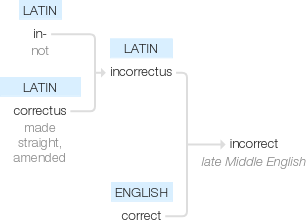Incorrect
late Middle English: from Latin incorrectus, from in- ‘not’ + correctus ‘made straight, amended’ (see correct). Originally in the general sense ‘uncorrected’, the word was later applied specifically to a book containing many errors because it had not been corrected for the press; hence incorrect (sense 2) (late 17th century).
wiktionary
From Middle French incorrect.
etymonline
incorrect (adj.)
early 15c., "uncorrected, not chastened into obedience," of sinners, etc. (a sense now obsolete), from Latin incorrectus "uncorrected, not revised," from in- "not" (see in- (1)) + correctus, past participle of corrigere "to put straight; to reform" (see correct (v.)). Sense of "not in good style" is from 1670s; that of "factually wrong, erroneous, inaccurate" is from 1750s (implied in incorrectly).
